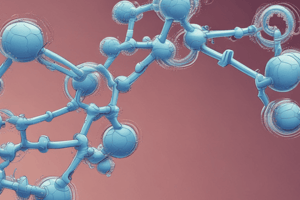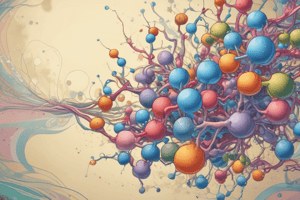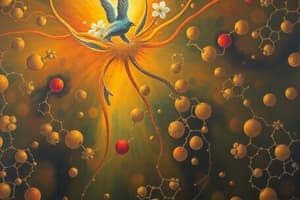Podcast
Questions and Answers
What determines the classification of fatty acids based on chain length?
What determines the classification of fatty acids based on chain length?
- Degree of saturation
- Position of the double bonds
- Number of carbon atoms (correct)
- Number of double bonds
What is a characteristic of the carbon chains in fatty acids?
What is a characteristic of the carbon chains in fatty acids?
- They are always unsaturated
- They are always branched
- They are unbranched (correct)
- They are always short
What is unique about the configuration of double bonds in fatty acids?
What is unique about the configuration of double bonds in fatty acids?
- They are always unsaturated
- They are always in a CIS configuration (correct)
- They are always in a TRANS configuration
- They are always saturated
Which of the following is a general feature of fatty acids?
Which of the following is a general feature of fatty acids?
What makes fatty acids amphipathic?
What makes fatty acids amphipathic?
What is a characteristic of saturated fatty acids?
What is a characteristic of saturated fatty acids?
What is the solubility of the fatty acid tail?
What is the solubility of the fatty acid tail?
What is an example of a short-chain fatty acid?
What is an example of a short-chain fatty acid?
What is the function of membrane lipids in a cell?
What is the function of membrane lipids in a cell?
What is the backbone of glycerophospholipids?
What is the backbone of glycerophospholipids?
What is the backbone of a Sphingoglycolipid?
What is the backbone of a Sphingoglycolipid?
What type of linkage connects the carbohydrate to the Sphingosine backbone?
What type of linkage connects the carbohydrate to the Sphingosine backbone?
What is the name of the simplest phospholipid?
What is the name of the simplest phospholipid?
What is the percentage of membrane lipids in the cell membrane?
What is the percentage of membrane lipids in the cell membrane?
What is the source of Cerebroside, a type of Sphingoglycolipid?
What is the source of Cerebroside, a type of Sphingoglycolipid?
What is the purpose of saponification in soap making?
What is the purpose of saponification in soap making?
What is the function of Cerebroside in the body?
What is the function of Cerebroside in the body?
What is the specific fatty acid attached to the Sphingosine backbone in Sphingomyelin?
What is the specific fatty acid attached to the Sphingosine backbone in Sphingomyelin?
What is the name of the process that creates soap?
What is the name of the process that creates soap?
What is the term for lipids that contain a phosphate group?
What is the term for lipids that contain a phosphate group?
What is the specific carbohydrate attached to the Sphingosine backbone in Sphingomyelin?
What is the specific carbohydrate attached to the Sphingosine backbone in Sphingomyelin?
What is the type of Sphingophospholipid that has a single monosaccharide unit?
What is the type of Sphingophospholipid that has a single monosaccharide unit?
What is the backbone of sphingophospholipids?
What is the backbone of sphingophospholipids?
What is the term for lipids that are part of the cell membrane?
What is the term for lipids that are part of the cell membrane?
Where is Cerebroside primarily found in the nervous system?
Where is Cerebroside primarily found in the nervous system?
What is the term for the combination of fatty acids and a phosphate group attached to a platform molecule?
What is the term for the combination of fatty acids and a phosphate group attached to a platform molecule?
What is the chain starting with the carbonyl group (C=O) classified as?
What is the chain starting with the carbonyl group (C=O) classified as?
What is the function of biological waxes in relation to hair and skin?
What is the function of biological waxes in relation to hair and skin?
What is stearic acid classified as?
What is stearic acid classified as?
What is the function of biological waxes in relation to animal fur?
What is the function of biological waxes in relation to animal fur?
What is the disadvantage of having oily skin in younger humans?
What is the disadvantage of having oily skin in younger humans?
What is the advantage of having oily skin as humans age?
What is the advantage of having oily skin as humans age?
What is the primary function of aldosterone?
What is the primary function of aldosterone?
What is the source of prostaglandin?
What is the source of prostaglandin?
What is the function of thromboxane?
What is the function of thromboxane?
What is the precursor or mother of all eicosanoids?
What is the precursor or mother of all eicosanoids?
What is unique about the structure of leukotriene?
What is unique about the structure of leukotriene?
What is the function of cortisol and cortisone?
What is the function of cortisol and cortisone?
What is the main difference between hormones and eicosanoids?
What is the main difference between hormones and eicosanoids?
What is the function of leukotriene in the body?
What is the function of leukotriene in the body?
What is the characteristic of eicosanoids that distinguishes them from hormones?
What is the characteristic of eicosanoids that distinguishes them from hormones?
What is the structure of prostaglandin?
What is the structure of prostaglandin?
Flashcards are hidden until you start studying
Study Notes
Fatty Acids: General Structure
- Fatty acids have a general structure consisting of a hydrocarbon chain with a carboxyl group at one end and a methyl group at the other end.
- The hydrocarbon chain is non-polar and water-insoluble, while the carboxyl group is polar and water-soluble, making fatty acids amphipathic.
- Fatty acids can be classified based on the length of their carbon chains, with short-chain fatty acids having 4-6 carbon atoms, medium-chain fatty acids having 8-10 carbon atoms, and long-chain fatty acids having more than 10 carbon atoms.
Fatty Acids: Features
- Fatty acids almost always have an even number of carbon atoms.
- Fatty acids have unbranched carbon chains.
- Saturated fatty acids have no double bonds, while unsaturated fatty acids have one or more double bonds.
- When present, double bonds in fatty acids are in the cis configuration.
Lipids: Types
- Lipids can be classified into different types based on their structure and function.
- The main types of lipids are fatty acids, triglycerides, phospholipids, and sterols.
Phospholipids
- Phospholipids are a type of lipid that has a phosphate group and a glycerol or sphingosine backbone.
- Phospholipids are amphipathic, with a hydrophobic tail and a hydrophilic head.
- Phospholipids are important components of cell membranes, making up about 80% of the mass of the cell membrane.
- Phospholipids have a platform molecule to which the fatty acids and phosphate group are attached.
Glycerophospholipids
- Glycerophospholipids are a type of phospholipid that has a glycerol backbone.
- The simplest glycerophospholipid is phosphatidic acid.
- Phosphatidic acid is a precursor to other phospholipids.
Sphingophospholipids
- Sphingophospholipids are a type of phospholipid that has a sphingosine backbone.
- Sphingophospholipids have an amino alcohol and a phosphate group.
- Sphingophospholipids are similar to glycerophospholipids, but with a sphingosine backbone instead of glycerol.
Sphingoglycolipids
- Sphingoglycolipids are a type of lipid that has a sphingosine backbone and a carbohydrate attached.
- The carbohydrate is attached to the sphingosine backbone through a glycosidic linkage.
- Sphingoglycolipids are found in the brain and are important components of the myelin sheath of nerve cells.
Eicosanoids
- Eicosanoids are a type of lipid that is synthesized from arachidonic acid in response to an external stimulus.
- Eicosanoids have profound physiological effects at extremely low concentrations.
- Eicosanoids are not stored in cells and are synthesized in response to a stimulus.
Prostaglandins
- Prostaglandins are a type of eicosanoid that has a cyclopentane ring and oxygen-containing functional groups.
- Prostaglandins are synthesized from the prostate gland and other tissues in both males and females.
- Prostaglandins have a variety of functions, including regulating the sleep and wake cycle.
Thromboxanes
- Thromboxanes are a type of eicosanoid that has a cyclic ether and is synthesized from blood platelets.
- Thromboxanes aid in the formation of blood clots.
Leukotrienes
- Leukotrienes are a type of eicosanoid that has 3 conjugated double bonds and is synthesized from white blood cells.
- Leukotrienes aid in blood clotting and have anti-inflammatory and hypersensitivity responses.
Waxes
- Waxes are a type of lipid that is water-insoluble and water-repellant.
- Waxes are secreted from skin glands in humans and animals.
- Waxes protect hair and skin, keeping it pliable and lubricated.
- Waxes can also impart water repellency to animal fur.
Studying That Suits You
Use AI to generate personalized quizzes and flashcards to suit your learning preferences.




